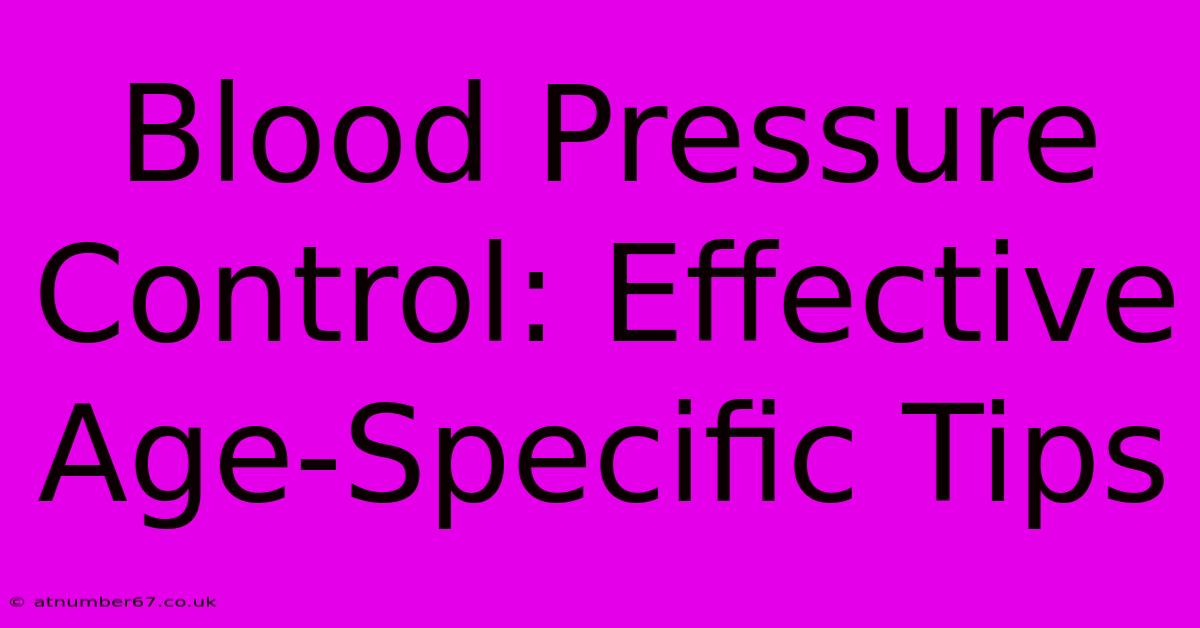Blood Pressure Control: Effective Age-Specific Tips

Table of Contents
Blood Pressure Control: Effective Age-Specific Tips
Maintaining healthy blood pressure is crucial for overall well-being, but the approach to blood pressure control often needs to be tailored to different life stages. What works for a young adult might not be as effective for a senior citizen. This article provides age-specific tips for effective blood pressure management, emphasizing lifestyle modifications and, when necessary, medical intervention. Remember, always consult your doctor before making significant changes to your diet, exercise routine, or medication regimen.
Blood Pressure Control in Young Adults (18-40 years)
This age group often faces blood pressure challenges due to lifestyle factors. Stress from work, school, or relationships, coupled with unhealthy eating habits and lack of exercise, can contribute to elevated blood pressure.
Key Strategies for Young Adults:
- Prioritize Healthy Eating: Focus on a diet rich in fruits, vegetables, whole grains, and lean protein. Limit processed foods, sugary drinks, and excessive sodium intake. DASH diet (Dietary Approaches to Stop Hypertension) is highly recommended.
- Regular Exercise: Aim for at least 150 minutes of moderate-intensity aerobic exercise or 75 minutes of vigorous-intensity aerobic exercise per week, spread throughout the week. Include strength training exercises twice a week.
- Manage Stress: Incorporate stress-reducing techniques like yoga, meditation, or deep breathing exercises into your daily routine. Sufficient sleep is also crucial.
- Limit Alcohol Consumption: Excessive alcohol intake can significantly raise blood pressure. Adhere to recommended guidelines for moderate alcohol consumption.
- Maintain a Healthy Weight: Obesity is a major risk factor for high blood pressure. Achieve and maintain a healthy weight through diet and exercise.
Blood Pressure Control in Middle-Aged Adults (40-60 years)
Middle age often brings increased responsibilities and potential lifestyle changes that can negatively impact blood pressure. Furthermore, the risk of underlying health conditions contributing to hypertension increases during this period.
Key Strategies for Middle-Aged Adults:
- Regular Health Checkups: Schedule regular check-ups with your doctor for blood pressure monitoring and overall health assessment. Early detection of hypertension is vital.
- Address Underlying Conditions: Manage existing conditions like diabetes, high cholesterol, and kidney disease, as these can significantly affect blood pressure.
- Medication Adherence: If prescribed blood pressure medication, strictly adhere to the prescribed dosage and schedule.
- Quit Smoking: Smoking damages blood vessels and increases blood pressure. Quitting smoking is crucial for cardiovascular health.
- Monitor Sodium Intake: Pay close attention to sodium levels in your food. Read food labels carefully and choose low-sodium options whenever possible.
Blood Pressure Control in Older Adults (60+ years)
As we age, our bodies undergo physiological changes that can affect blood pressure. Older adults are more susceptible to hypertension and its complications.
Key Strategies for Older Adults:
- Regular Medication Review: Discuss your medication regimen with your doctor regularly. Adjustments might be necessary as your health needs change.
- Fall Prevention: High blood pressure can increase the risk of falls. Take steps to prevent falls, such as improving home safety and using assistive devices if needed.
- Cognitive Health: Maintain cognitive function through activities like puzzles, reading, and social interaction. Cognitive decline can be linked to cardiovascular health.
- Social Engagement: Maintain strong social connections and participate in activities that promote mental and emotional well-being.
- Adequate Hydration: Ensure adequate fluid intake, especially during hot weather, to prevent dehydration, which can affect blood pressure.
Conclusion: A Holistic Approach to Blood Pressure Management
Effective blood pressure control requires a personalized, holistic approach that considers individual age, lifestyle, and health status. While medication plays a vital role for many, lifestyle modifications form the cornerstone of long-term blood pressure management across all age groups. By prioritizing healthy habits and seeking regular medical advice, you can significantly reduce your risk of hypertension and its associated complications, leading to a healthier and longer life. Remember to consult your doctor for personalized recommendations.

Thank you for visiting our website wich cover about Blood Pressure Control: Effective Age-Specific Tips. We hope the information provided has been useful to you. Feel free to contact us if you have any questions or need further assistance. See you next time and dont miss to bookmark.
Featured Posts
-
The Life And Times Of Ruth Elliss Son
Apr 06, 2025
-
Gyanendra Shah His Age And Its Significance
Apr 06, 2025
-
Revealing The Secrets Of Endricks Age
Apr 06, 2025
-
Dad N Me Game Family Fun Guaranteed
Apr 06, 2025
-
Caroline Wozniackis Net Worth A Detailed Breakdown
Apr 06, 2025
